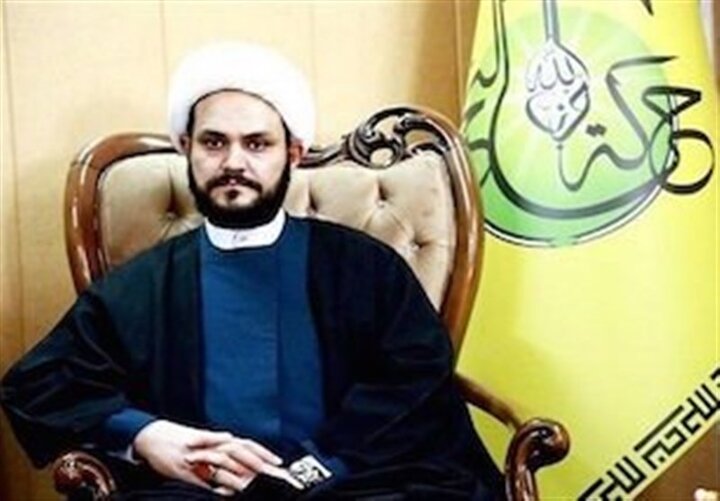The Nujaba Movement, a prominent Shiite terrorist militia from Iraq, has emerged as one of the region’s most influential forces due to its strong affiliations with Iran. Founded in 2013 by Akram al-Kaabi, a former senior leader of the Mahdi Army, the movement has played a pivotal role in both Iraq and Syria. It has aligned itself with Iran’s broader regional strategy, joining forces with Iranian-backed groups such as Hezbollah and the Syrian army in crucial battles.
The Nujaba Movement’s ideological roots are deeply tied to Iran, especially the concept of “Wilayat al-Faqih,” which requires political and religious loyalty to the Iranian Supreme Leader, Ali Khamenei. This connection has positioned Nujaba as a key extension of Iran’s regional influence, particularly in Iraq and Syria. Iran has provided significant financial and military assistance to Nujaba, along with intelligence sharing and oversight of its leadership. A 2017 report from the Washington Institute revealed Nujaba’s close relationship with the Quds Force, the Iranian Revolutionary Guard Corps (IRGC) division responsible for operations outside Iran. This alignment with Tehran has led to the U.S. designating Nujaba as a “terrorist organization” in 2019, citing its role in military operations across Iraq and Syria and its involvement in supporting Bashar al-Assad’s regime.
While Nujaba plays an important role within the Shiite Popular Mobilization Forces (PMF) in Iraq, its most significant impact has been in Syria. The movement was one of the first Shiite militias to cross into Syria, where it joined forces with Syrian government troops, Hezbollah, and Iranian units to defend the Assad regime. Although initially framed as a mission to protect Shiite shrines, the intervention also helped secure Iran’s long-term geopolitical interests in Syria. Nujaba’s military operations in Syria have been extensive, particularly in key battlegrounds such as Damascus, Aleppo, and Hama. It played a significant role in lifting the sieges on Shiite-majority villages like Nubl and Zahra and has become a critical component in the defense of the Assad regime.
The Nujaba Movement’s commitment to “Wilayat al-Faqih” has reinforced its loyalty to Iran and Hezbollah. Nujaba leader Akram al-Kaabi has openly praised Hezbollah Secretary-General Hassan Nasrallah, calling him a “Muhammadan Arab model of resistance against imperialism.” This ideological bond has further entrenched Nujaba within Iran’s broader strategy to extend its influence across the Middle East through a network of allied militias. Iran closely monitors Nujaba’s leadership, providing training for its fighters through Iranian military advisors and Hezbollah experts. The group is also heavily funded by Tehran, enabling its military expansion in both Iraq and Syria.
The Nujaba Movement’s involvement in the deadly crackdown, which resulted in the deaths of over 1000 protesters, raised serious concerns about its increasing power and its influence over Iraq’s political and security landscape. The group’s reputation for sectarian violence, combined with its ideological loyalty to Iran’s Supreme Leader Ali Khamenei, has made it a controversial force in both Iraq and the broader Middle East. Nujaba’s actions, particularly in Syria, have sparked controversy. In 2016, videos surfaced showing Nujaba fighters dragging and mocking a Syrian opposition fighter, accompanied by sectarian remarks. These incidents have raised concerns about the movement’s role in inflaming sectarian tensions in the region. The U.S. and Western countries have taken a firm stance against Nujaba’s growing influence. Its designation as a terrorist organization reflects concerns over its involvement in destabilizing efforts aimed at maintaining Iranian control in Iraq and Syria. Nujaba’s growing power is now a central issue in the broader struggle over Iran’s regional influence.
The Nujaba Movement’s rise highlights Iran’s successful strategy of cultivating powerful proxy forces to project its power across the Middle East without direct military intervention. Through groups like Nujaba, Iran has been able to assert its dominance not only in Iraq and Syria but also in Lebanon, Yemen, and beyond. The movement’s ability to mobilize thousands of fighters, its unwavering loyalty to Tehran, and its critical role in the Shiite Popular Mobilization Forces make it a formidable player in the ongoing regional struggle for influence. For Iran, Nujaba and other affiliated militias are essential to securing its interests and expanding its reach across the Middle East.
The Nujaba Movement is a clear example of the growing power of Iranian-backed militias in the Middle East. With its strong allegiance to Tehran, substantial military capabilities, and strategic role in Iraq and Syria, Nujaba remains a central figure in Iran’s regional ambitions. As tensions in Syria continue to escalate and Iran faces mounting opposition, the Nujaba Movement is poised to remain a key player in shaping the future of the region.
